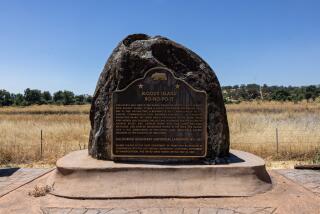What’s in a Name? Take Your Pick
After 19-year-old Debra Jean Jones got a divorce, she cut her hair, lost 50 pounds and moved into a new apartment. But nothing seemed to pull her out of her doldrums.
Then she seized upon something dramatic: She would change her name.
After a five-minute court appearance, plain Debbie Jones turned into exotic Cybal Fabreona Del Vecchio. Now 27, Studio City resident Del Vecchio says: “It was like getting a face lift, but cheaper and more fun.”
Unlike plastic surgery, though, the possibilities are limitless.
“You can call yourself whatever you like,” says Los Angeles County Commissioner Christine B. Hickman, who presided over the Los Angeles name-change court until late July. “That’s the way it should be. It’s really no one’s business what you call yourself. The court really can’t step in and tell you what is proper and what isn’t.”
Every week, dozens of people change their names in Los Angeles County courthouses. Many are divorced women wanting their birth names back, children seeking to adopt stepfathers’ names, aspiring actors looking for catchy monikers. Some are transsexuals desiring names to accompany their new genders. Others are homosexual couples petitioning for identical surnames.
But the majority of those who seek new names do so simply because they don’t like the ones they were given at birth.
A case in point is William Wilson Bobo, a 27-year-old insurance worker from Van Nuys, who decided he had heard enough jokes about his surname. The final straw came soon after he learned what his name meant in another culture.
“I married a Colombian woman, and she informed me that the word bobo in Colombia is slang for idiot,” he said. “She got tired of being married to Mr. Idiot.”
Leaves Happy
So in early July, William Wilson Bobo became Beau Wilson Williams. Upon leaving Los Angeles Superior Court, Williams smiled and kissed his wife.
“This is something I’ve wanted to do since I was 15,” he said. “Growing up with a name like Bobo leads you to a lot of playful harassment. I used to respond when kids called me Bozo or Boo-boo.”
Hickman says that unlike other courtrooms, in which there are winners and losers, in name-change court, “Everyone leaves happy. People have a look of relief when they get out of this court. It’s a burden lifted.”
Indeed, for many, a name change has a cathartic effect--a severing of ties from an unpleasant past and a hope for the future’s promise.
That’s how Sydne Desiree Holder, a 26-year-old North Hollywood woman, said she felt when her name change was granted last month.
‘Delicate, Prissy’
Before she was Sydne, she was Sabrina, named after the title of a 1954 film starring Audrey Hepburn and Humphrey Bogart. Holder has hated the name Sabrina for as long as she can remember.
“You think of a delicate, prissy little creature when you hear it, “ Holder said, avoiding even a mention of her former name. “I have almost a pathological hatred for the name. It’s just not me anymore.”
While no records are kept on the number of name changes granted, Hickman said that about 100 petitions are approved monthly in the downtown Los Angeles court. In the Van Nuys courthouse, the number is about 15 a month, said Superior Court Judge Diane Wayne, who supervises name changes there.
The cost for the process is $164: $99 to file a petition with the county clerk, $60 to publish four consecutive weekly notices in a legal newspaper and $5 to file the decree with the secretary of state in Sacramento. The services of an attorney are not needed.
‘Nothing to It’
“There’s really nothing to it,” Hickman said. Petitioners must make one court appearance, which usually lasts no longer than 10 minutes.
In California, as in all other states, as long as the proposed change is not intended to defraud creditors, a person can legally pick any name he or she wants.
Apparently, the only exception is when a petitioner seeks to change his name to a number, as in the case of a Minneapolis teacher who, in 1978, petitioned to change his name to 1069. A Superior Court judge refused to grant the change, a decision upheld by the U.S. Supreme Court in 1980.
Some Makes the News
Some of those who make the change also make the news, often because of the unusual nature of the switch. Among those are:
Ellen Cooperman, a 31-year-old New York feminist, who legally changed her name to Ellen Cooperperson in 1973.
Robert Earl Lee, a Navy captain from Maryland, who changed his name to Roberto Eduardo Leon in hopes that he would be eligible for affirmative-action employment programs.
Frederick Koch, father of Vermont Olympic silver-medalist skier Bill Koch, who changed his name in November to Coke-Is-It. He said he was tired of hearing his name mispronounced “Kotch” or “Cook.”
But, says Van Nuys Superior Court Judge Joel Rudof, in spite of how many people do it, there really isn’t any legal reason to change a name.
“All you have to do is start calling yourself something, begin filling out forms with your new name on them, and voila!, you’re a new person,” he said. “Using a name other than what’s on your birth certificate is your option; it’s not illegal.”
More to Read
Sign up for Essential California
The most important California stories and recommendations in your inbox every morning.
You may occasionally receive promotional content from the Los Angeles Times.









